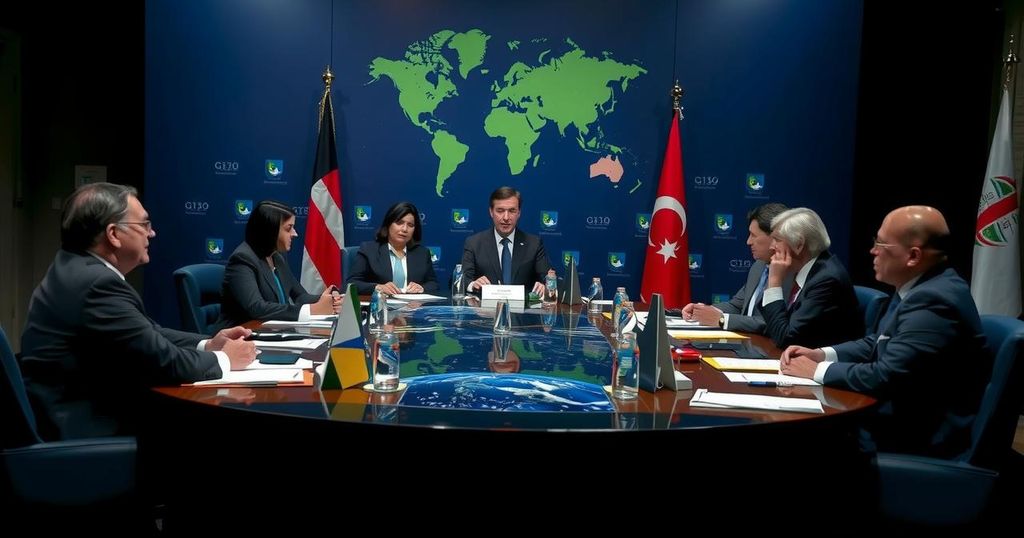The UN warns that failure to secure climate financing for poorer nations at the G20 summit may lead to devastating economic consequences. The discussions come as negotiations at Cop29 stall, emphasizing the urgency of financial commitments to support climate actions. UN officials stress that without bold measures, all G20 nations risk suffering from climate-induced economic turmoil.
The United Nations has issued a stern warning that the G20 leaders, convening in Rio de Janeiro, must reach consensus on climate finance for impoverished nations, or risk impending “economic carnage.” The G20 summit, coinciding with stalled negotiations at the Cop29 climate crisis summit, brings to the forefront the urgent need for substantial financial support for poor countries to combat climate change. Simon Stiell, the UN’s climate chief, underscored that the G20 was established to address global challenges collectively, with climate action being a paramount concern. He cautioned that unmitigated climate impacts are already jeopardizing economies, taking a toll on lives, supply chains, and contributing to inflation. Furthermore, he highlighted that without significant emission reductions, all G20 nations would face severe economic repercussions. In addition, the leaders must deliberate on debt relief, as many developing nations struggle to implement necessary climate measures amidst burdensome debt levels exacerbated by rising interest rates. Stiell emphasized the importance of clear signals from the G20 regarding international collaboration in confronting global warming, positing that cooperation remains vital for humanity’s survival. While recent climate talks in Baku attracted only a few heads of state, calls for a significant financial commitment from the G20 echo the aspirations for a comprehensive agreement at Cop29, which seeks to secure $1 trillion annually in climate finance by 2030. This amount reflects research indicating that the total financial requirement for developing nations to meet the Paris climate accord’s objectives is approximately $2.4 trillion yearly, two-thirds of which can derive from domestic sources. Research indicates that half of the necessary external funding should emerge from the private sector, a quarter from institutions like the World Bank, and the remainder from a mix of philanthropic contributions, foreign aid, imposed levies on high-carbon practices, and revenues from carbon credit sales. Concurrently, the integrity of future climate summits has been questioned, with notable environmental figures advocating for hosting restrictions to ensure participating countries demonstrate firm commitments to climate action. Azerbaijan, hosting Cop29, has a long-established economy reliant on fossil fuels, with about 90% of its exports stemming from this sector, leading to accusations of conflicts of interest in climate negotiations. The upcoming G20 meeting holds significance for setting international climate finance policies, with Brazil’s President Lula da Silva likely advocating for both increased financial pledges and tighter emission targets before deadlines set for next year’s major climate meeting. The UK has proactively submitted ambitious targets, reaffirming its commitment to overseas climate finance despite political challenges. As discussions at Cop29 continue into the coming days, stakeholders remain hopeful for progress, indicating that a determined response is needed in the following week to enhance the pace and efficacy of negotiations.
The article focuses on the necessity for G20 leaders to agree upon climate finance for poor countries during their meeting in Rio de Janeiro. With crucial negotiations stalled at the Cop29 climate summit, UN officials signal that immediate support is crucial to mitigate the effects of climate change and avoid bankruptcy for vulnerable nations. Emphasizing global collaboration, the UN calls for leaders to fulfill financial commitments that are integral to achieving climate goals established in the Paris Agreement.
In summary, the UN has urged G20 leaders to prioritize climate finance discussions during their upcoming summit, underlying the dire consequences of inaction as countries face increasing economic strain from climate impacts. The immediate need for international cooperation on funding arrangements is crucial for supporting developing nations in the fight against climate change. The outcomes of these negotiations could significantly influence future global financial strategies and climate policies at the forthcoming Cop29.
Original Source: www.theguardian.com






